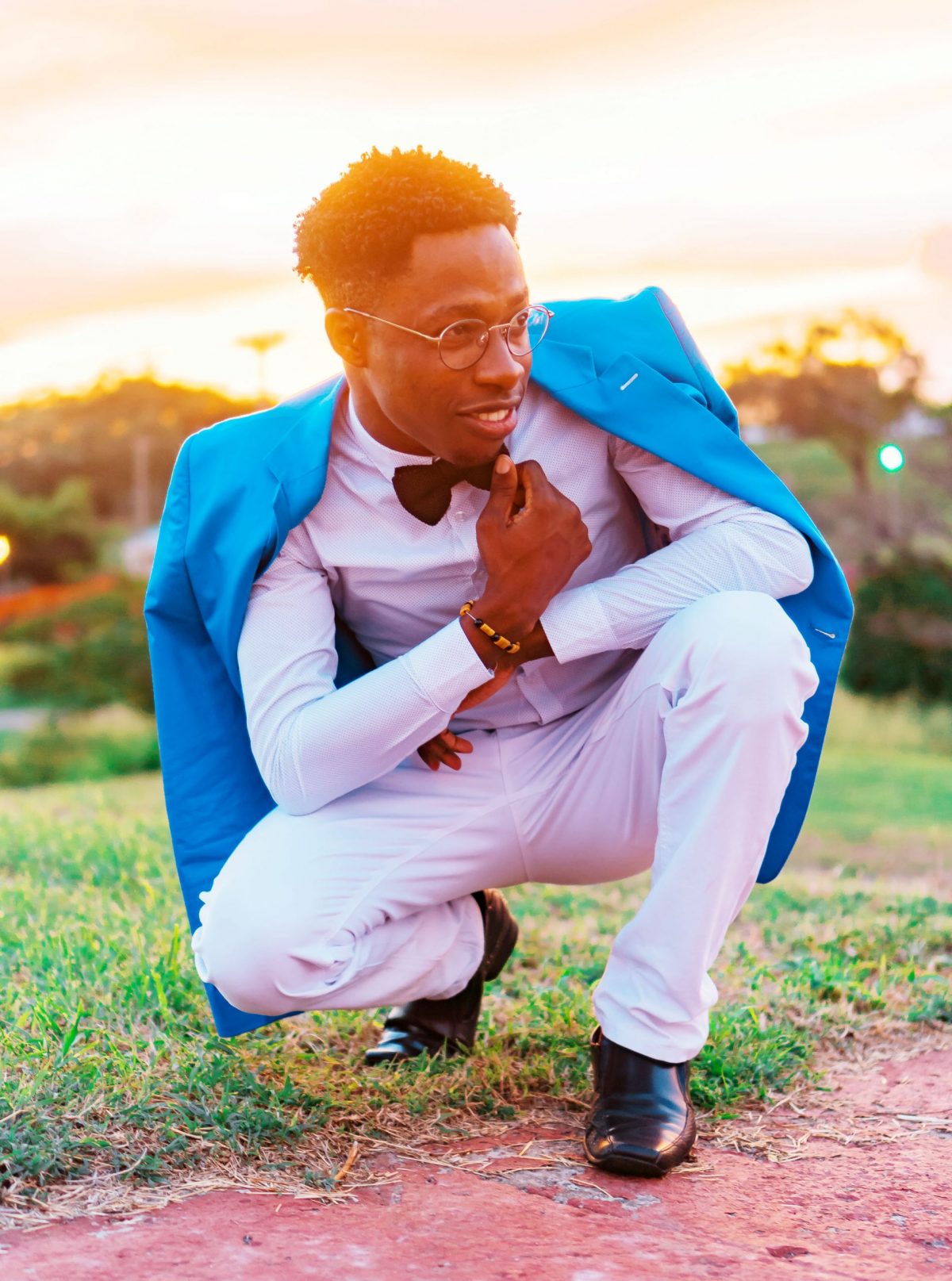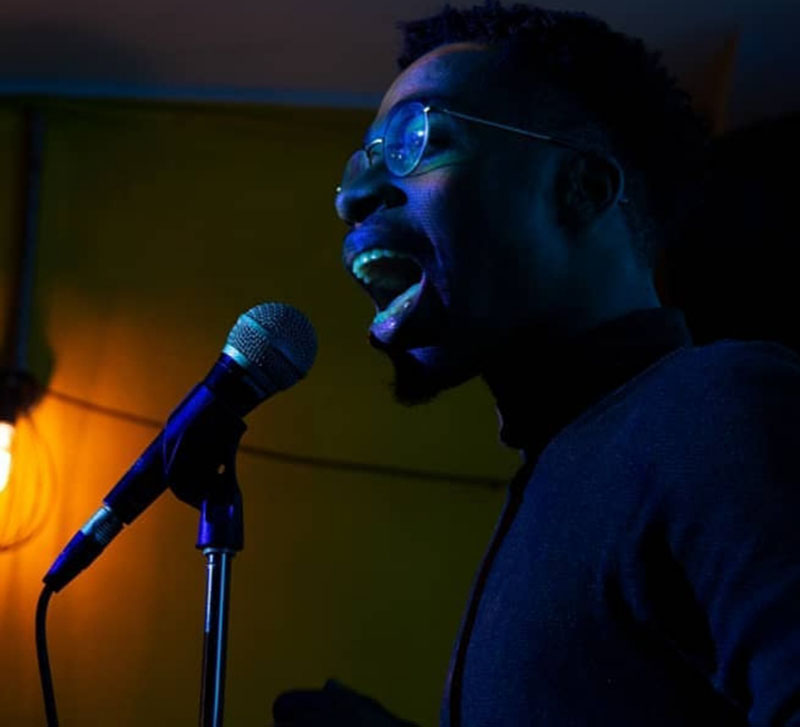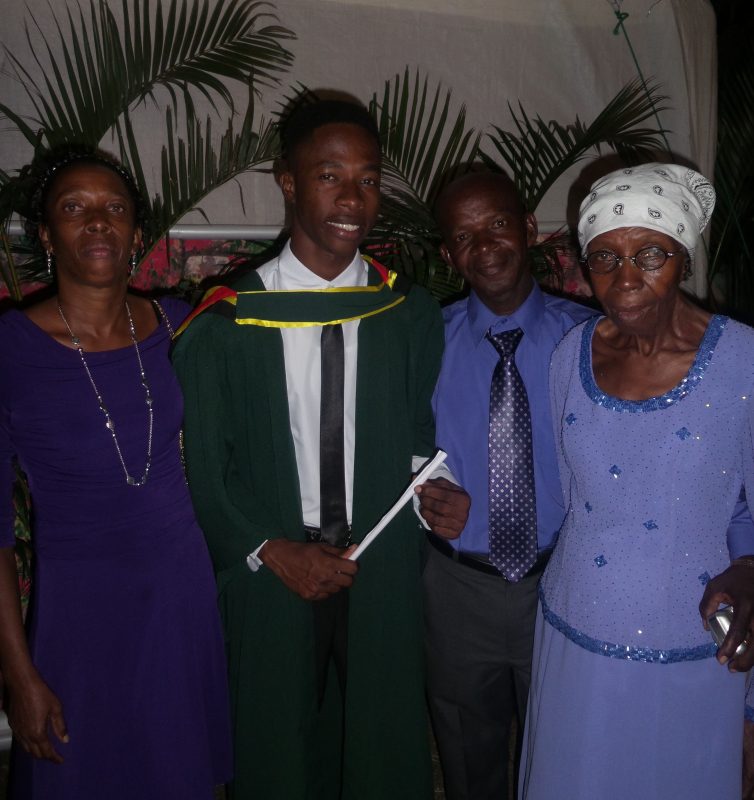Dr Terrence Isaacs is currently completing his residency in the United Kingdom to become a consultant in medical psycho-therapy. He is also an author. And a poet. And an actor. And a podcaster.
How does he find time to do it all? The young doctor, who spent some of his formative years in the village of Victoria, East Coast Demerara, said it is not a case of him being a Jack of all trades, but rather of him challenging himself.
“…I challenge myself to set goals and then crush them to the point that sometimes I wonder if I am doing enough. However, I believe when you have a passion for something you will find the time and you will go after your goals,” he told Stabroek Weekend during an interview from the United Kingdom.
He clearly fully utilises all of the 24 hours in a day doing the things he has a passion for, which means at any given time you can find him either in his white doctor’s coat, with a microphone in hand giving goosebumps as he churns out the spoken word, putting pen to paper as he chronicles his thoughts or inspiring with his words of wisdom during one of his podcasts.
“I will not lie, I do not always manage my time effectively or efficiently. But I can manage my work, poetry, writing, other goals along with my personal life well enough. Scheduling and having the help of loved ones who can hold me accountable allows me to do all these things,” he said.
However, he did add that he does not have the responsibility of marriage and children to contend with but he has to ensure that he is taking time out for himself and loved ones and for him “a balance between work and play” is essential.
Initially it was a battle between whether he would become a lawyer or doctor but the latter won out and another battle had to be fought over the paths to surgery or psychiatry. The internal struggle went on for a while. Many expected him to be a surgeon but two internships made him realise he hated it.
Today as he is closer to becoming a psychiatrist, Dr Isaacs shared that mental health is an “overlooked area in Guyana both from a government perspective and from a general public perspective”.
There was a point in time when he was also one of the individuals who shared the view that “mental illnesses aren’t real things. In fact, growing up, I thought ‘Psychiatrists aren’t even real doctors.’ I guess karma has a way of getting back at us.”
Over the years, his studies and training helped him to understand that the reason why Guyanese treat mental health and those who have mental illnesses the way they do is because of the country’s colonial past. Religious and cultural beliefs, he added, encourage the practice of viewing mental illness as evil spirits. With few available services available and a high poverty rate, many Guyanese suffer in silence with mental illnesses.
“Sadly, our guiding policies are still from the 1930s, this is an outdated policy that we still use in some form today,” the young doctor pointed out.
He was referring to the 1930 British Guiana Mental Health Ordinance, which was drafted with the intention “to make provision for the care of persons of unsound mind and for the administration and management of the Mental Hospital, Berbice”. Some 91 years later, that ordinance is still in effect.
‘Feel at home’
“Psychiatry is where I feel at home,” was how Dr Isaacs described his main profession. He said he knew he wanted to do psychiatry since around his third year of medical school. At the time, he was an avid volunteer with the Ministry of Health’s Peer Educator Programme,.
He said talking to Guyanese youths throughout the country made him realise that “helping persons in this way and addressing their mental health is what I am passionate about”. He added, “I had to listen to my gut and my own feelings and not simply go with what others thought I should do.”
For Isaacs, to improve the health and well-being of all Guyanese there must be an overhaul of how mental illness is viewed in Guyana. “We need to start with a countrywide awareness campaign to get persons to understand that mental health and illnesses are as real and as important as physical health and illnesses,” he suggested.
He called on the government to prioritise improving the policies that guide mental health care along with making available better services and more professionals working in the area. “I believe these are some of the immediate things that can be done to improve how mental health is viewed. It will result in less stigma and if we can get faith-based leaders and influential persons on board we can see how this can become something that all Guyanese can benefit from,” he posited.
Always a wordsmith
As was previously mentioned, there are many sides to Dr Isaacs. He revealed that he has always been a poet, with his first recital being for Road Safety Week at about the age of eight.
“I started writing [short stories and poetry] around the age of 11,” he shared. He started taking it seriously in 2014 when he attended his first poetry night at the Upscale Restaurant. Two years later he was a finalist at the inaugural Guyana National Poetry Slam and since then he has performed at several events in Guyana, at the VOICES 7 in Grenada and at several events around the United Kingdom.
He is also now an executive member of Spice And Clove, a creative organisation in Guyana. In terms of his poetry Isaacs said his goal is to be a renowned Guyanese poet both on page and as a spoken word artist.
“Besides writing and poetry, I have dabbled in acting as well. I did drama in community college, acted in plays at church and even did a PSA for my final year project at medical school,”he related.
He was the recipient of the Best Supporting Actor award in the debutante category at the 2015 National Drama Festival. Should time permit, he will get back into that part of his life.
He revealed that he also has a passion for writing fiction, and while he is yet to publish a novel, he has been able to do something else.
Over the last year he has published two books. The first is a self-help/motivational book aimed at helping young adults realise their best potential and take steps to become their best selves. That book is titled, You Are Your Biggest Critic: 30 Life Lessons to Learn Before Turning 30. It was influenced by his own experiences and valuable lessons he had learnt.
“While most of it was trial and error, I am hopeful that others would be able to learn vicariously from my experiences,” he said of the book, which started out as a series of Facebook posts he made to celebrate his 28th birthday. He had aimed to share 28 lessons he learned, but never completed it. Years later he revisited it and the result was the book. He said since its publication last April the response has been quite positive. The paperback and ebook are available for purchase on Amazon, and the paperback is being sold at The Book Hub and In Between the Covers in Guyana.
The second book is vastly different. It is his debut poetry collection titled, Love Me: Unconditionally, in which he explores his relationship with love. Some of the poems reflect different aspects of his love life, both past and present, and the highs and the lows.
“I believe being authentic is an important way to share my own experiences. I wanted to create something that showcased the different shades of love and have a collection that others can relate with regardless of which shade they have experienced,” he shared.
Love Me is only available in ebook format for purchase on Amazon and on his Facebook page.
Bros before Egos
Isaacs said earlier this year he completed Season One of “Bros before Egos”, which is a video podcast he started on his Facebook page aimed at having candid conversations with men about all things manly.
“I realised that there are limited safe spaces for men to have these conversations. I also realised that if we want to change the world and the toxic behaviours of men then we have to do the work,” he said.
He has always been interested in how men can better themselves, he said, noting that he too had once been actively engaged in toxic behaviour, harming people and not dealing with the consequences. He has since matured and has realised that part of the problem in the world is that a disservice is being done to boys.
“We emotionally amputate them,” he pointed out. “We groom them into becoming these hard beings then expect them to magically unlearn these behaviours as men.”
The goal of the podcast is to get men talking about how they view the world, what shapes their views and how they can improve their own lives. The first season talked about masculinity and explored its different facets, while the second season aims to dive more into men and relationships. He said he hoped by having these conversations to change the narrative and promote raising better boys who can become men proud of their own reflections.
Growing up in Victoria
Dr Isaacs recalled that growing up in the countryside of Guyana was a challenging part of his life. However, he believes those experiences catapulted him to where he is today. He said he and his two siblings had moved to Victoria when he was around one, after his parents migrated to Barbados to create a better life for themselves and children.
He spent the first ten years of his life in Victoria being raised by his grandmother, who was a disciplinarian.
“She was not one to spare the rod and spoil the child. In fact, anything she could get her hands on to discipline us she would utilise. She was a no-nonsense kind of woman. What I do know now [even though] I would not advocate for corporal punishment, is that she loved us the only way she knew how,” he said of those days.
But growing up with a disciplinarian meant he always had to be on his best behaviour and even have to share the consequences of the actions of his siblings. So to avoid “licks” he would be on his best behaviour and looking back he believes that was what propelled him towards reading and learning. They had no running water, light, television, inside toilet, or their own bedrooms. He and his siblings slept on “bedding” under their grandmother’s bed. They shared a house the size of a master bedroom with an aunt and two uncles and later a younger cousin.
His parents ensured they sent what little they had to assist his grandmother in raising them and she tried her best to make ends meet.
“Despite growing up in poverty, my grandmother was one of my biggest motivators and encouragers. She, along with my parents, siblings, aunts, and uncles encouraged me to excel at academics. I was always bringing first in class all throughout primary school,” he said.
An injury to his grandmother’s foot is what he believes sparked his interest in medicine as he recalled he was both “excited and distraught all at once” even though all he wanted to do was help her.
His grandmother was an active church-goer and would ensure he and his siblings attended religiously. He believes this foundation of faith was another pillar that allowed him to step out of poverty. For him, were it not for God and the encouragement of his grandmother and family, his life would have turned out very differently.
Isaacs migrated to Barbados with his family at the age of 12, but later returned to complete his medical degree and had proposed that after medical school he would migrate to the United Kingdom as it was a place where he always wanted to live. The reason for migrating later changed as he realised he needed to have first world experience and training during his residency, something Guyana was unable to give him. He pointed out that to date there is still no training programme for medical psychotherapy in Guyana (a medical doctor who is a psychotherapist).
“I really like this specialty because it is a perfect blend of psychiatry and psychology. At the end of my training I would be a consultant who can offer psychological therapies and also one who can offer psychiatric therapies,” he noted.
Looking to the future, Dr Isaacs said he sees endless opportunities even as he wants to inspire others to be better versions of themselves. He also aims to improve the healthcare system in Guyana and the lives of ordinary Guyanese citizens.
“I can assure you that Terrence Dwight Isaacs will be a name that the world will come to know and admire,” the young doctor said.








